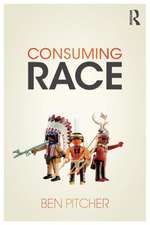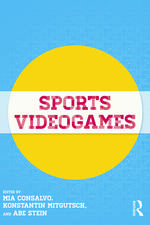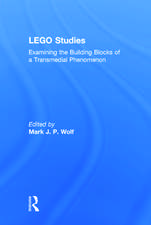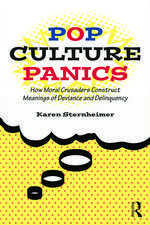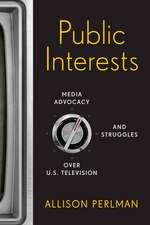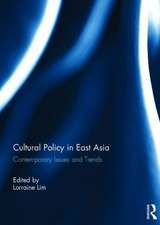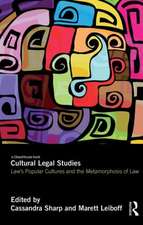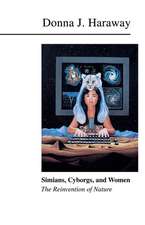Flow TV: Television in the Age of Media Convergence
Editat de Michael Kackman, Marnie Binfield, Matthew Thomas Payne, Allison Perlman, Bryan Seboken Limba Engleză Hardback – 14 sep 2010
Flow TV examines television in an age of technological, economic, and cultural convergence. Seeking to frame a new set of concerns for television studies in the 21st century, this collection of all new essays establishes television’s continued importance in a shifting media culture. Considering television and new media not as solely technical devices, but also as social technologies, the essays in this anthology insist that we turn our attention to the social, political, and cultural practices that surround and inform those devices' use. The contributors examine television through a range of critical approaches from formal and industrial analysis to critical technology studies, reception studies, political economy, and critiques of television's transnational flows. This volume grows out of the critical community formed around the popular online journal Flow: A Critical Form on Television and Media Culture (flowtv.org). It is ideal for courses in television studies or media convergence.
| Toate formatele și edițiile | Preț | Express |
|---|---|---|
| Paperback (1) | 360.72 lei 6-8 săpt. | |
| Taylor & Francis – 14 sep 2010 | 360.72 lei 6-8 săpt. | |
| Hardback (1) | 1227.38 lei 6-8 săpt. | |
| Taylor & Francis – 14 sep 2010 | 1227.38 lei 6-8 săpt. |
Preț: 1227.38 lei
Preț vechi: 1496.80 lei
-18% Nou
Puncte Express: 1841
Preț estimativ în valută:
234.86€ • 242.30$ • 195.99£
234.86€ • 242.30$ • 195.99£
Carte tipărită la comandă
Livrare economică 26 martie-09 aprilie
Preluare comenzi: 021 569.72.76
Specificații
ISBN-13: 9780415992220
ISBN-10: 0415992222
Pagini: 310
Ilustrații: Illustrations
Dimensiuni: 152 x 229 x 18 mm
Greutate: 0.72 kg
Ediția:1
Editura: Taylor & Francis
Colecția Routledge
Locul publicării:Oxford, United Kingdom
ISBN-10: 0415992222
Pagini: 310
Ilustrații: Illustrations
Dimensiuni: 152 x 229 x 18 mm
Greutate: 0.72 kg
Ediția:1
Editura: Taylor & Francis
Colecția Routledge
Locul publicării:Oxford, United Kingdom
Public țintă
Postgraduate and UndergraduateCuprins
Introduction
Part I: The Convergent Experience: Viewing Practices Across Media Forms
1. Media Interfaces, Networked Media Spaces, and the Mass Customization of Everyday Space, Daniel Chamberlain
2. "It's Just Like a Mini-Mall": Textuality and Participatory Culture on YouTube, David Gurney
3. TiVoing Childhood: Time-Shifting a Generation's Concept of Television, Jason Mittell
4. Affective Convergence in Reality Television: A Case Study in Divergence Culture, Jack Bratich
5. Industry Convergence Shows: Reality TV and the Leisure Franchise, Misha Kavka
Part II: Creating Authors / Creating Audiences
6. More "Moments of Television": Online Cult Television Authorship, Derek Kompare
7. The Reviews Are In: TV Critics and the (Pre)Creation of Meaning, Jonathan Gray
8. "Word of Mouth on Steroids": Hailing the Millennial Media Fan, Louisa Ellen Stein
9. Masters of Horror: TV Auteurism and the Progressive Potential of a Disreputable Genre, Heather Hendershot
10. 49 Up: Television, "Life-Time," and the Mediated Self, John Corner
Part III: Technologies of Citizenship: Politics, Nationality, and Contemporary Television
11. Television/televisión, Hector Amaya
12. The Limits of the Cellular Imaginary, Eric Freedman
13. Extreme Makeover: Iraq Edition -- "TV Freedom" and Other Experiments for "Advancing" Liberal Government in Iraq, James Hay
14. Representing the Presidency: Viral Videos, Intertextuality, and Political Participation, Chuck Tryon
15. NASCAR Nation and Television: Race-ing Whiteness, L.S. Kim
Part I: The Convergent Experience: Viewing Practices Across Media Forms
1. Media Interfaces, Networked Media Spaces, and the Mass Customization of Everyday Space, Daniel Chamberlain
2. "It's Just Like a Mini-Mall": Textuality and Participatory Culture on YouTube, David Gurney
3. TiVoing Childhood: Time-Shifting a Generation's Concept of Television, Jason Mittell
4. Affective Convergence in Reality Television: A Case Study in Divergence Culture, Jack Bratich
5. Industry Convergence Shows: Reality TV and the Leisure Franchise, Misha Kavka
Part II: Creating Authors / Creating Audiences
6. More "Moments of Television": Online Cult Television Authorship, Derek Kompare
7. The Reviews Are In: TV Critics and the (Pre)Creation of Meaning, Jonathan Gray
8. "Word of Mouth on Steroids": Hailing the Millennial Media Fan, Louisa Ellen Stein
9. Masters of Horror: TV Auteurism and the Progressive Potential of a Disreputable Genre, Heather Hendershot
10. 49 Up: Television, "Life-Time," and the Mediated Self, John Corner
Part III: Technologies of Citizenship: Politics, Nationality, and Contemporary Television
11. Television/televisión, Hector Amaya
12. The Limits of the Cellular Imaginary, Eric Freedman
13. Extreme Makeover: Iraq Edition -- "TV Freedom" and Other Experiments for "Advancing" Liberal Government in Iraq, James Hay
14. Representing the Presidency: Viral Videos, Intertextuality, and Political Participation, Chuck Tryon
15. NASCAR Nation and Television: Race-ing Whiteness, L.S. Kim
Recenzii
"Flow TV brings together a wide array of scholars to provocatively interrogate the sprawling and converging world of televisual media culture. Both celebrating new potentials of the digital age, and acting as a canary in the gemeinschaft, the book dramatizes why critical media studies matters now more than ever."--Matthew Jordan, Pennsylvania State University
"The essays in this collection offer exciting, but level-headed analyses of television at the beginning of the 21st century. Together, they offer wonderful tributes, extensions, and complications of Raymond Williams' concept of 'flow,' analyzing television's still developing technology and cultural form without simply embracing the hype of the 'digital age'."--Brenton J. Malin, University of Pittsburgh
"The essays in this collection offer exciting, but level-headed analyses of television at the beginning of the 21st century. Together, they offer wonderful tributes, extensions, and complications of Raymond Williams' concept of 'flow,' analyzing television's still developing technology and cultural form without simply embracing the hype of the 'digital age'."--Brenton J. Malin, University of Pittsburgh


